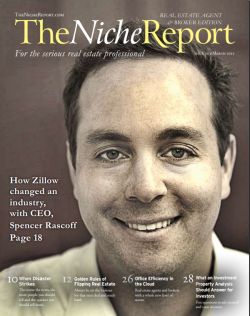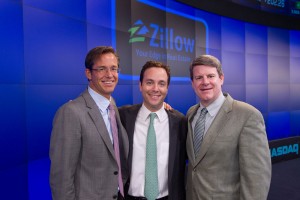If you are a consumer looking to buy a home, you use Zillow. If you are a seller looking to understand where to price your home, you use Zillow. If you are a Real Estate agent, you use Zillow. If you are a curious neighbor seeking to know information about the homes nearby, you use Zillow.

(TheNicheReport.com) -- If you are a consumer looking to buy a home, you use Zillow. If you are a seller looking to understand where to price your home, you use Zillow. If you are a Real Estate agent, you use Zillow. If you are a curious neighbor seeking to know information about the homes nearby, you use Zillow. Zillow.com is both a professional tool and a guilty pleasure. If you aren’t familiar with it, they revolutionized how we easily track, keep up to date and stay on top of property values. It is more than a website; it is a repository of information about millions of homes. Property values, taxes, purchase events – it is all there within Zillow. The origins of this improbable company have talented and highly innovative roots, amidst the shadows of Microsoft and the rolling hills of downtown Seattle.
I had the opportunity to sit down with the CEO of Zillow Inc, Spencer Rascoff. It was a great opportunity to gauge the present and future technology direction of real estate. Rascoff is an innovator; his background comes from the heart of heralded technology folklore - a Harvard graduate in liberal arts (Government), Wall Street M&A and co-founder of Hotwire.com, a leading internet travel company. The only thing better than his academic and business pedigree was seeing how much he enjoyed talking about his kids and their habit of writing on the walls of Zillow’s conference rooms.
Speaking with him it was clear that the growth of Zillow isn’t as much about the money as it is about creating a lasting legacy and mark within an industry. That is the beauty of how children see the world. Children want to see the world as fun, colorful and useful. It doesn’t matter how much money you have, your background, degrees and accolades. What matters is the kind of person you are, how you lead others, and your ability to make those around you better at what they do. I am, admittedly, taking some poetic license, as these aren’t things that Spencer actually told me. However my view of Spencer seemed to be summed up in the beautiful simplicity of his children coloring on the high-tech walls of Zillow’s conference rooms, overlooking some of the most breathtaking views of Seattle.
It was the second time that I’d been at Zillow. I was in Zillow’s former headquarters in the Wells Fargo building in downtown in Seattle in 2009. A friend of mine, introduced me to Lloyd Frink, co founder of Zillow and founder of Expedia.com, another internet travel company and former competitor of Hotwire (The parent company of Expedia purchased Hotwire in 2003). Lloyd gave us a walking tour of the corridors of Zillow’s headquarters; it was like taking a walk down a lovely Seattle neighborhood. Each hallway had a street name and everyone’s office was their ‘home.’ It was decorated like a neighborhood with street lamps, signs and the construction that gave the appearance of a quaint neighborhood. The positive and fun culture of a Silicon Valley startup company was radiating through its walls – the only difference - it wasn’t burdened with the excesses of Silicon Valley. It had the lovely backdrop of the Needle overlooking Puget Sound.
Rich Barton and Lloyd Frink started Zillow in early 2005, and Zillow launched in early 2006. The concept was an evolution of ideas that resulted from his search for a home and how difficult it was to collect information on homes – taxes, historical purchase data, valuation information, etc. With this, Zillow was born, housing (no pun intended….well, maybe just a little) data and information was made readily available about millions of U.S. homes.

Zillow CEO Rascoff (C) with Co-founders Barton (L) and Frink (R)
Rascoff joined the company from the beginning, in 2005, and was on the original team that left Expedia to help get Zillow off the ground.
“Strategically and thematically, the Zillow story hasn’t changed much,” Spencer reflects. “The goal is to empower consumers to make smarter decisions with easy access to information. We’ve spent the last six years delivering on this, and we will spend the next sixteen years doing much of the same.” Spencer goes on to say “Our first product was Zestimates, which tried to educate every consumer on the value of homes. We started with 40 million homes.”
I asked Rascoff what was his experience at Zillow in the beginning? And he responded, “I had such a close relationship with Lloyd Frink, one of the founders of Expedia who acquired Hotwire. Lloyd had left Expedia to start a real estate tech company. He introduced me to Rich Barton, Zillow’s co-founder. To have a team like that get behind a technology company, my response was simple - whatever it is, I want in!”
Rascoff’s first role at Zillow was the Chief Marketing Officer and they consolidated the role (as many startups do) to head up Finance. “I didn’t know anything about marketing in the beginning,” quipped Rascoff. “Because of my private equity background, I gravitated toward the finance side(s) of the business but it became apparent, I needed help. It was then, I turned to Amy Bohutinsky from Hotwire to come over to Zillow to help; she is our marketing officer to this day.”
What I noticed in talking with Rascoff, is his entrepreneurism, he’s an innovator, a white collar, technology executive with a roll-up the sleeves, blue collar spirit. Now that Zillow is profitable and a publicly traded company (a first time for Rascoff), I had to ask - What if Zillow loses that small, startup type feel? “As CEO, the culture of Zillow is in my control. It is possible to maintain an innovative culture in medium to large companies so long as management operates this way. We are doing some really exciting and innovative things like establishing new product lines, platforms expanding our rental category and we are always on the look for acquiring other companies.”
What are Rascoff’s goals for Zillow and what are the results? Let’s review this and give a little background.
Upon talking with Rascoff and his executive team, the goal for Zillow is to make the process of searching for a home more democratic, accessible and transparent. They are succeeding. With over 50,000 ratings and reviews on Real Estate Agents, over 10,000 reviews on mortgage lenders, Zillow has over 4 million listings for homes for sale. Whether it is buying, selling, renting, leasing, remodeling or financing a home, Zillow empowers consumers with the information possible to make decisions about housing and real estate.
“The company we resemble the most in both strategy and business model is WebMD, the leading healthcare website. They shower you with information and articles. We do much of the same thing. We make money from advertising similar to the way WebMD makes money” states Rascoff.
Rascoff’s competence in the subject matter is both serious and tangible. Hotwire, the company he cofounded, was sold in 2003 for $685M. It is worth mentioning that he was six years from graduating from Harvard; not a bad start to his working career. He was humble about this, almost uncomfortable reviewing this history with me. It is such a remarkably successful start to a working career and at such a young age. Rascoff quickly replaced his youth with experienced results.
Zillow is one of the most recognized real estate brands and most visited real estate websites on the internet. Its iPhone app is the most popular real estate app downloaded on iTunes marketplace, used over 8 million times per month with more than 41 million visits to home detail pages. Zillow collects data and information on nearly every home in the United States, roughly 100 million homes and counting.
Zillow has crossover appeal, enabling visitors to search homes for sale, homes for rent, recently sold homes, Make Me Move homes and more. Through their separately branded Mortgage Marketplace, borrowers are able to search mortgage products and lenders that are right for them, while potential buyers and sellers can find housing professionals in their real estate directory. If there are questions that arise, the visitor can ask questions and find answers in Zillow Advice. Homeowners can browse remodeling ideas in Dueling Digs, or browse the latest real estate trends in their neighborhood via Zillow’s local data pages.
Erin Lantz, Director of Zillow Mortgage Marketplace, explained to me how borrowers connect with lenders, She states “We are successfully empowering borrowers to compare mortgage rates in a transparent fashion. We have hundreds of lenders that price out consumer inquiries for a mortgage, based upon configured criteria; borrowers are able to do so anonymously.”
Zillow successfully integrates multiple Product & Pricing engines – NYLX, MoreTech, etc. Regardless of which pricing engine a lender uses, they can integrate their respective mortgage operation into Zillow’s platform. “The borrower makes apples-to-apples comparisons between lenders and mortgage products.”
Truly, Zillow is the Expedia for Real Estate in the method of which it aggregates information, but Spencer was quick to point out, “We are different than Expedia because Expedia sells tickets while we sell information and advertising.” Additionally, Rascoff is realistic about where Zillow is currently and the accuracy of its information. “It is a starting point; it is not a formal appraisal of your home. Just like WebMD is just a starting point to investigate an ailment or physical issue, Zillow provides that first look. If you want a more specific appraisal then you should be working with a Real Estate professional.” The information is a conversation starter between the agent and the consumer with Zillow. Rascoff calls this the “Triangle of Tension.”
Zillow works closely with consumers and with Real Estate Professional to make sure that the value is correctly positioned. They clearly would like to get it right all of the time. Zillow trains agents around the country to address concerns they may have when speaking to the variance in perceived property values. Rascoff was correct to point out that the Zestimates are on tens of thousands of agent websites as a portal to provide consumers with a way to gauge the value of a home. This is clearly an indication Zillow is winning in the housing market with Real Estate professionals as their partners to providing this service to consumers.
How does Zillow make money?
“Revenues are broken down between two main components,” Rascoff reviewed with me, “The Agent Market Place and the Lender Marketplace; about 60% of our revenue is Market Place revenue – local real estate revenue, premier agent business and the Zillow mortgage market place. Forty percent is display advertising, national brands, etc., who have a connection to the process. That revenue segment is growing but not as quickly as the Market Place revenue which has grown over 200% year over year.”
“To illustrate this further, Zillow manages approximately 300,000 loan requests per month. These are consumer-controlled inquiries, and if a consumer likes what they see, they can choose to speak with the lender of their choice. We make revenue from these leads as they are distributed to the mortgage lender,” Spencer is quick to point out. “We’ve tried from the beginning and we will continue to reinforce this point in everything we do, and that is here we empower consumers in making the most important and difficult decision of their financial lives and, while doing so, we have a business model to make money in the process.”
But where does Zillow go from here?
“Mobile. It is all about mobile. Mortgage calculators, REFI calculators, refreshed mortgage rates streamed to a consumer’s mobile device – mobile has been an accelerant to our growth. Between 25-30% of our usage is on mobile; 50 homes are viewed each second using mobile apps.” Spencer elaborates further by emphasizing, “We have a business model that works on mobile already where most internet companies are struggling with this conversion.”
The mobile usage at Zillow is intuitive and it is inherently mobile. The Zillow business model is selling exposure to Real Estate agents, and this is a very dynamic process. It is clear that Zillow will remain on top of this growing market and yet, with only 1 percent wallet market share of advertising from real estate agents, this is just the beginning for what is already an incredibly successful company, led by one of the most talented internet innovators in the market today.
 Rick Roque, Managing Editor, TNR for Real Estate Agents & Brokers. [email protected]
Rick Roque, Managing Editor, TNR for Real Estate Agents & Brokers. [email protected]



